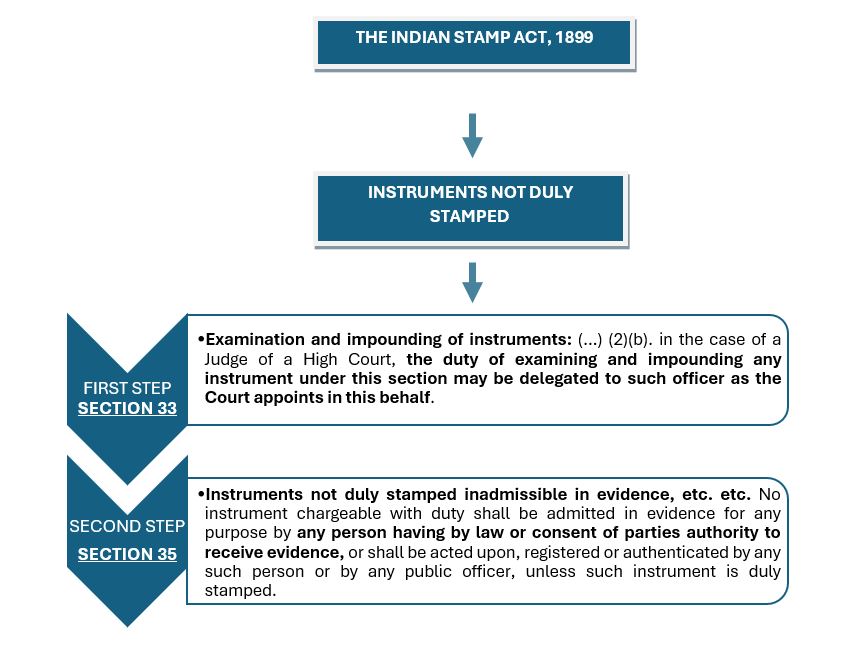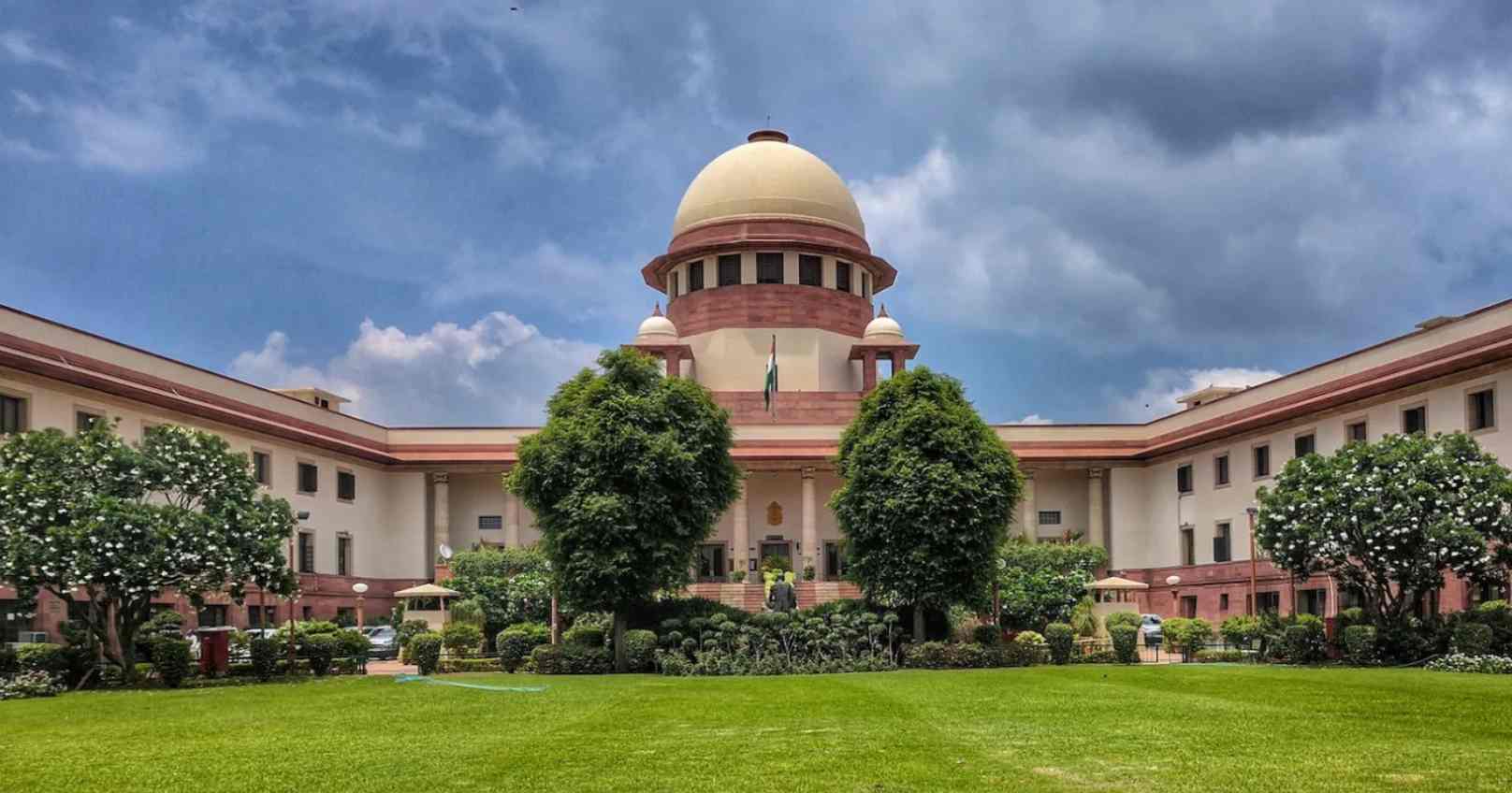I. INTRODUCTION
The present analysis provides an interpretative bridge between the Indian Stamp Act, 1899 (“1899 Act”) and the Arbitration and Conciliation Act, 1996 (“1996 Act”) to address an ongoing and contentious issue qua interference by Courts at pre-reference stage in cases where the underlying instrument containing an arbitration agreement is unstamped or insufficiently stamped.
In order to appreciate the relevancy of the said issue, it is necessary to refer and analyse current framework in terms of N.N. Global saga – culminating before the Hon’ble Supreme Court of India to reconsider its Constitution Bench in N.N. Global Mercantile (P) Ltd. v. Indo Unique Flame Ltd (“N.N. Global - II”). Further, the Hon’ble Supreme Court has in N.N. Global – II held that an unstamped instrument is non-existing and invalid as a contract under the Indian Contract Act. Consequently, the Court under Section 11 of 1996 Act would determine whether an instrument is sufficiently stamped which would defeat the essence of arbitration.
That issue that requires clarity is: whether an instrument is duly and/or sufficiently stamped should not be considered by a Court at pre-reference stage, especially, under Section 11 of 1996 Act, or should the arbitrator/ arbitral tribunal in line with the principle of ‘Kompetenz-Kompetenz’ and ‘doctrine of severability’ have the jurisdiction to decide the same. Further, whether a harmonious interpretation of Section 11 of 1996 Act and Section 33(2)(b) of 1899 Act mandates the Court to ‘delegate’ adjudication of the issue of stamping as per 1899 Act to the arbitrator also needs to be considered by the Court.
II. N. N. GLOBAL SAGA – BRIEF OVERVIEW
That a three-Judge bench of the Hon’ble Supreme Court in N.N. Global Mercantile (P) Ltd. v. Indo Unique Flame Ltd. (“N.N. Global I”) considered whether an arbitration agreement in an unstamped agreement is a valid contract or not. The Supreme Court after extensively analysing the ‘doctrine of Kompetenz-Kompetenz’ and severability, as enshrined in Section 16 of 1996 Act, and referring to the minimal judicial interference contemplated under Section 5 of 1996 Act, held that non-payment of stamp duty on the substantive agreement, containing an arbitration agreement, would not invalidate even the main contract as non-payment of stamp duty is a curable defect. Thus, non-payment of stamp duty on substantive contract will not render the arbitration clause/agreement as invalid or unenforceable, since the arbitration clause/agreement has an independent existence of its own. Further, the Supreme Court was also of the view that ‘the doctrine of severability’ should be extended to the issue of stamping, similar to its application in case of registration of agreements, consequently, an arbitration agreement in not chargeable to payment of stamp duty.
It is also important to note that the Supreme Court in NN Global I expressed disagreement with its earlier decisions in SMS Tea Estates (P) Ltd. v. Chandmari Tea Co. (P) Ltd. (“SMS Tea Estates”) and Garware Wall Ropes Ltd. v. Coastal Marine Constructions & Engg. Ltd. (“Garware”) wherein it was held that an arbitration agreement in an unstamped agreement is unenforceable and cannot be acted upon. However, the Supreme Court noted that the decision in Garware had been relied upon with approval by a co-ordinate bench of the Supreme Court in Vidya Drolia v. Durga Trading Corpn. In light of the above contrary views, the Supreme Court in N.N. Global – I, referred the matter to Constitution Bench of five Judges for authoritatively settling the issue as under:
“Whether the statutory bar contained in Section 35 of the Stamp Act, 1899 applicable to instruments chargeable to stamp duty under Section 3 read with the Schedule to the Act, would render the arbitration agreement contained in such an instrument, which is not chargeable to payment of stamp duty, as being non-existent, unenforceable, or invalid, pending payment of stamp duty on the substantive contract/instrument?”
II.(A). N. N. GLOBAL – II: EXPANDING COURT’S INTERFERENCE AT PRE-REFERENCE STAGE
The Constitution Bench of Supreme Court in N. N. Global – II decided the reference from N.N. Global – I by a majority of 3:2 wherein it is held that an arbitration agreement if not stamped or insufficiently stamped in terms of 1899 Act, then such an arbitration agreement would be unenforceable, invalid and cannot be acted upon, unless procedure prescribed under the 1899 Act for impounding and payment of necessary duty is complied with by the parties. Further, it was held that a Court acting under Section 11 is duty bound to act under Section 33 of 1899 Act.
However, minority opinions of both J. Ajay Rastogi and J. Hrishikesh Roy, differed greatly from the majority, holding that the non-stamping or insufficient stamping is a curable defect and does not render the arbitration agreement unenforceable or invalid. It is also relevant to note that J. Roy, stressed on Section 7 of 1996 Act that prescribes mandatory ingredients for a valid arbitration agreement, and the 1996 Act being a special legislation would prevail over the requirements under 1899 Act which is a general legislation.
It is noteworthy to mention that the aforesaid distinction led to a situation requiring the Court at the stage of appointment of arbitrator under Section 11 of 1996 Act to ascertain whether proper stamp duty has been paid on the instrument containing arbitration agreement. Thereafter, the Hon’ble Supreme Court vide its order dated 26.09.2023 in Curative Petition (C) No. 44 of 2023 referred the decision in NN Global II to a seven-Judge Constitutional Bench to reconsider the correctness of the majority view taken by the five-Judge Bench. The Curative Petition before the seven-Judge Bench heard the matter at length and passed its judgement dated 13.12.2023 (“NN Global III”).
However, to appreciate the decision of the 7 Judges in NN Global III it is imperative to discuss the central doctrines and/or principles governing the arbitration law in India and deliberate upon the foundation of 1996 Act:
The objective of UNCITRAL Model Law (“UNCITRAL”) is to provide parties with efficient, effective and economical resolution of their disputes, by minimizing the supervisory role of courts in the arbitral process. The doctrine of autonomie de la volonté (i.e., ‘autonomy of the will’) mandated in UNCITRAL with minimal interference is provided in Section 5 of the 1996 Act, which prohibits the Courts in arbitral process. A conjoint reading of Section 5 and Section 16 of the 1996 Act would make it clear that all matters, including issue as to whether the main contract was void/voidable, should be referred to arbitration.
III. DOCTRINE OF “KOMPETENZ-KOMPETENZ”
It is settled law that that an arbitration agreement is a separate and distinct agreement that is independent from the substantive contract and the same has been incorporated under Section 16 of the 1996 Act. As a rule, the invalidity, ineffectiveness, or termination of the substantive contract, would not affect the validity of the arbitration agreement. Further, the doctrine of ‘Kompetenz-Kompetenz’ also incorporated in Section 16 of the 1996 Act mandate the tribunal to adjudicate upon jurisdiction, thus restricting judicial interference in arbitral process specifically at pre- referral stage.
IV. DOCTRINE OF SEPARABILITY
The doctrine of separability forms the foundation of the well settled proposition in the jurisprudence of arbitration that arbitration clause is an independent agreement which is separate and distinct from the substantive contract. The said doctrine ensures that the arbitration agreement is not rendered unenforceable/invalid upon the substantive contract being void/invalid/unenforceable.
V. SECTION 11 OF 1996 ACT: EXTENT OF COURT’S INTERFERENCE
Section 11 (6-A) of the 1996 Act is limited only to ‘existence’ of arbitration agreement. On reading the language in Section 11(6-A) with Section 5 of 1996 Act, it is apparent that the scope of the interference is narrow. The Arbitration and Conciliation (Amendment) Act, 2019 has amended Section 11 whereby interference by the Court has been further whittled down by donning the power of appointment of arbitrators entirely upon arbitral institutions. Moreover, Section 11(6-B) of the1996 Act inserted vide Act 3 of 2016 clarifies that designation of any person/institution for purposes of Section 11 “shall not be regarded as a delegation of judicial power”. Although the aforesaid amendments have not been notified, the intention of the Legislature is to ensure minimal interference at pre-referral stage which is evident from the same.
VI. AMBIGUITY WITH REERENCE TO SECTION 9 OF THE 1996 ACT
The 3 Judge bench in NN Global I has passed pertinent observations on the issue of granting interim measure under Section 9 of 1996 Act in cases where substantive contract containing the arbitration is not duly stamped. The Court was of the view that in cases where an application under Section 9 for urgent interim relief before the Court, and it is brought to the attention of the Court that the substantive contract is not duly stamped, the Court would grant interim relief to safeguard the subject-matter of the arbitration. The said observation of the three-Judge bench of Hon’ble Supreme Court has grave implications in light of findings of the Constitution Bench in NN Global II to the extent that the Constitution Bench have kept the issue of effect of an unstamped agreement on redress under Section 9 of 1996 Act open and has not decided upon it. Therefore, the findings of the three Judge Bench of Hon’ble Supreme Court in NN Global I are now final and are the settled law on the issue of Court granting interim measures under Section 9 even when the substantive contract containing the arbitration agreement is not duly stamped.
The aforesaid is also supported by the decision in NN Global III where in the Court upheld the view that at the stage of Section 9 the Court is not required to consider the issues of stamping.
VII. BRIDGE BETWEEN 1996 ACT AND 1899 ACT- SECTION 33(2)(b) OF 1899 ACT
Examination of an arbitration agreement with respect to stamping at pre-referral stage should not be undertaken by Courts. This finds supports in Chapter-IV:
‘Instruments not duly stamped’ of the 1899 Act; for the ease of reference procedural flowchart is produced below:

It is evident from the preceding chart and plain reading of Section 33 and Section 35 of the 1899 Act, that for an instrument to be admissible under Section 35, prerequisites qua examination and impounding of the instrument under Section 33 is mandatory.
Further, the statutory bar in Section 35 of 1899 Act would be triggered only when there is a finding that the document is not duly stamped pursuant to an inquiry/examination under Section 33 thereof. Moreover, Section 33(2)(b) of the 1899 Act mandates the Court to delegate the duty to examine and impound instruments not duly stamped to a person/officer appointed by the Court and there is no prohibition under the 1899 Act to delegate such power to an arbitrator. Thus, inquiry/examination under Section 33 (pre-requisite of Section 35) of 1899 Act should be undertaken by an appointed arbitrator under Section 11 of 1996 Act.
VIII. CONCLUSION: END OF NN GLOBAL SAGA
The Supreme Court in NN Global III, finally laid to rest the position on the issues of stamping vis-à-vis reference of parties to arbitration under Section 11 of ACA 1996. The Court has rightly concluded that an objection “as to stamping does not fall for determination under Sections 8 or 11 of the Arbitration Act, and the concerned court must examine whether the arbitration agreement prima facie exists” . As argued by the author herein harmonious construction of Section 11 of the 1996 Act read with Section 33(2)(b) and Section 35 of the 1899 Act undisputedly does not preclude an arbitrator to examine stamp duty or impound or admit an instrument in evidence as the delegation under Section 33(2)(b) and Section 35 of 1899 Act could be to any person having by law or consent of parties including an arbitrator, and authority to receive evidence.
Even if it is assumed that the 1899 Act is a substantive law, the aforesaid harmonious construction does not undermine the Stamp Act. In my view, the primary objective of 1899 Act of revenue generation could still be achieved even if the collection of stamp duty is deferred to the arbitrator and is not collected at the stage of a Judge referring the matter for arbitration. The referring Judge can also caution the arbitrator on the aspect of no/deficient stamp duty on the instrument concerned in case of any such issue being raised before the Judge. The aforesaid course will protect both the interest of the revenue and the substantive law.








